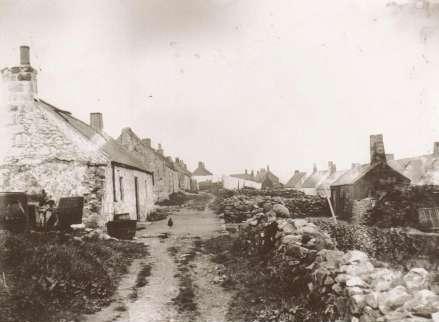
The Jubilee Hall |
My memories of the Jubilee Hall consist of Friday night discos in the 1970’s, an introduction to underage drinking and some of my first furtive fumblings with the opposite sex. However that’s another story and not something we are going to go into here!
The idea of a building a public hall in the Portlethen area had been around for many years but it wasn’t until the 1880’s that the idea gained momentum and turned into reality. Before then, local meetings and events had to be held in the public school hall which was the only accommodation available for such matters, and not entirely suitable for large get-togethers.
The local parishioners formed a committee with the purpose of planning and building a public hall in the district, and they enlisted the help of local farmer, land valuator and architect, George J. Walker, who was a man of influence and one of the leading voices in the community.
Under Walker’s guidance things began to happen very quickly. The land owner, Mrs Taylor, was approached on the subject and she elected to give a site “free for all time coming”. It was determined that the best place to situate the hall was a site conveniently placed midway between the railway station and the manse.
The balance of the funds that were needed had to be raised by a series of fetes and bazaars, much of which was organised and driven by Mrs. Walker and an enthusiastic team of committee members.
Whilst the committee were raising funds Mr. Walker busied himself with drawing up plans for the hall and his design of a plain but commodious building capable of holding 400 people was accepted. The name “Jubilee Hall” was picked as a celebration of Queen Victoria’s Golden Jubilee in 1887.
The foundation stone of the Jubilee Hall was laid in August 1889 by Mrs Walker and the proceedings were opened by the Reverend A.R. Grant. At this ceremony George J. Walker made a few remarks in respect to all the people that had contributed to make the building possible, with special thanks to Mrs Taylor and in particular to the ladies of the district for all their hard work and fund raising. He also noted that there were one hundred and twenty people closely involved in the process, seventy six of which were women and forty four men.
Mr. Taylor of Clashfarquhar (unrelated to the aforementioned Mrs Taylor) in a closing speech thanked the gentlemen who had helped to promote the scheme for the erection of the hall, said that in addition to commemorating the jubilee of the Sovereign, the hall would be a lasting monument to those who inaugurated the plan, and whose labour and industry had surmounted all the difficulies that had came before them. He acknowledged that although the people lived in a parish where there were very few rich residents in the district, they had found a great deal of sympathy and support.
Mr Taylor further went on to acknowledge Mr. Walkers role by giving special thanks to him, quoting the fact that he “had spared neither time nor means to assist them in their efforts to get the hall. There was one thing that would be ever fresh and pleasant in the memories of those who had in any way assisted in the work, and that was that they had helped to advance the comfort and happiness of the people of the parish".
A time capsule, in the form of a copper cylinder, was laid underneath the foundation stone and within it was placed some silver coins from the jubilee year of the sovereign, copies of the “Aberdeen Journal” and other local newspapers from the same year and finally, a written list of those people who played a prominent role in the movement for the erection of a public hall.
The Jubilee Hall was officially opened on Friday 27th June 1890 and the event was inaugurated by a concert “of a most varied and excellent character” and included a variety of song and dance performed by the Cairnwell string band. It’s interesting to note that a song was composed and performed especially for the occasion. On the occasion of the opening, the hall was filled by a “pleased and enthusiastic audience”, and this was the first of many concerts that were performed in the Jubilee Hall.
Today the hall still sits on its original site but the fields and pastures that used to surround it have been replaced by housing and, the village of Portlethen has expanded on all sides, around the hall. The Jubilee Hall is still a valuable commodity to the community of Portlethen but as time has passed its role has diminished somewhat compared to the early years when it was in regular use for entertainment and public meetings. Nowadays local people tend to use the schools for such matters and, additionally, there is a second hall sited next to Portlethen Church. Although none of us would like to see the removal of the Jubilee Hall, it would appear that its heydays are now well in the past.
.jpg)



